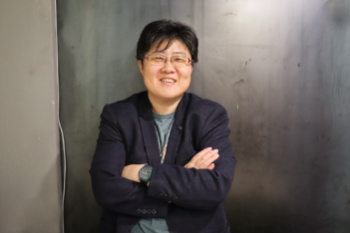
“The cyber world is growing fast with the IT industry; however, all the abnormal and illegal sex markets are moving to the cyber world and growing rapidly at the same time. The problem is there is neither a safety net nor a solution for those sex markets.”
These are the words of Cho Jinkyeong, an alumnus who majored in Christian studies and graduated from Ewha in '92. Cho is the executive director of Stand Up Against SexTrafficking of Minors, which is also known as Teens Up. Teens Up is a South Korean NGO that works to improve the teenage girls’ rights, especially focusing on protection for young victims of sex-trafficking.
Since she graduated from Ewha more than 20 years ago, Cho has been working as an activist, meeting many victims of sex-trafficking in their youth. She founded Teens Up in 2012 because she wanted to create a safe place for minors.
“Most of the victims came from underprivileged households where they were often exposed to child abuse, domestic violence, and lack of attention and care from their parents,” Cho said. “Girls from such backgrounds are inevitably put in a vulnerable state where it’s easy to be taken advantage of by sex offenders. I wanted to create a safe house that could aid them before they were coerced into sex markets.”
Teens Up has been running three major projects to help the teenagers: connecting vulnerable children to the Seoul Education Center for Youth in Crisis, Stop N Start Project, and Cyber Torae Counseling Project.
Cyber Torae Counseling Project is a comprehensive project that intervenes in online sex-trade and offers peer counseling. The term Torae means peers or people of the same age group. They persuade juveniles to visit the center, and when they come, the center supports them directly with Stop N Start Project. This project gives direct and practical support by providing legal advice, medical aid, and psychotherapy sessions. It also links the victims to other agencies and organizations for further rehabilitation such as academic accreditation. Cho emphasized that the projects work together in synergy to enable full aid for teenagers.
Cho further criticized the abnormal education system in Korea that neglects students who may fall into crime.
“In Korea, the places in which teenagers spend the majority of their time are limited to their schools and homes,” Cho pointed out. “The rest of them who are outside school and home are often branded as juvenile delinquents. A lot of the teenagers have no choice but to escape from domestic and school violence, and yet they face more difficulties to lead a secure life due to such stigma.”
Present laws regarding sextrafficking consider teenagers as a sextrade contractors. Victims are offered juvenile protective dispositions, which are segmented in several levels: the weaker measures would leave a juvenile under parental care, and the stronger measures would send a juvenile to a youth detention center. However, Cho criticized the limitations behind this law.
“There is an unfair measure in disposition because it ultimately penalizes them based on their backgrounds, not on their level of delinquency,” Cho said. “Girls without parents are the top priority among people subject to protective disposition. Yet, when a teenager from a privileged household commits a serious crime, they don’t get sent to a youth detention center because they have a parent who is powerful and wealthy enough to take care of them.”
Cho further pointed out the problems on the “poisonous” clauses in the current sex protection laws for children. Normally, minors are excluded from punishment because they are considered not to have legal rights. Sex-trafficking, however, is an exception to this rule as minors are punished and held responsible for this specific contract.
“The cause of sex-trafficking is adults,” Cho said. “Minors are only the victims. The Ministry of Justice sees and treats sex-trafficking minors as if they were the average criminal, which states that if the victim shows that he/she will never get involved in sex-trafficking again, he/she will be exempt from punishment. However, such a statement should be demanded of the offenders, not the victims.”
Cho also emphasized the necessity of people’s attention to solve this social problem.
“Everyone should join together to solve this,” Cho stated. “Sextrafficking is not a problem of ‘someone.’ Anyone can be a victim, and I hope we make progress together for a better future. Joining together for teenage girls’ rights is an important matter. It’s about making a new path, and we will get through it eventually.”

